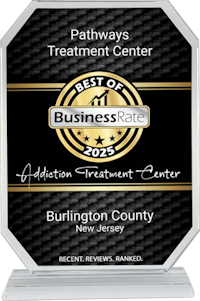Bipolar and Addiction Treatment in Burlington, New Jersey
Bipolar disorder presents unique challenges in addiction recovery. Our clinicians provide comprehensive support to stabilize mood, manage symptoms, and support long-term sobriety through evidence-based dual diagnosis care.
At Pathways Treatment Center, we are your trusted partner in navigating the complexities of bipolar disorder and addiction. Located in Burlington, New Jersey, our center provides comprehensive care for individuals affected by these challenging conditions.
Bipolar disorder is a prevalent mental health issue in the United States, impacting approximately 2.8% of the population. This condition is characterized by dramatic shifts in mood, energy, and activity levels, often making daily life a struggle. Compounding the challenges faced by those with bipolar disorder is the high incidence of co-occurring substance use disorders. Studies indicate that up to 60% of individuals with bipolar disorder also experience substance abuse issues, a factor that can exacerbate symptoms and complicate treatment.
At Pathways Treatment Center, we understand the intricate relationship between bipolar disorder and addiction. Our integrated dual diagnosis treatment approach is designed to address both conditions simultaneously, ensuring that each individual’s unique needs are met with empathy and expertise. Our team of professionals is committed to helping you or your loved one achieve stability and recovery through personalized care plans that incorporate the latest evidence-based practices.
Bipolar Disorder and Addiction: Understanding the Connection
What is Bipolar Disorder?
Bipolar disorder is a mental health condition characterized by extreme mood swings that include emotional highs (mania or hypomania) and lows (depression). These mood episodes can drastically impact a person’s energy levels, activity, judgment, and ability to think clearly. This condition can affect anyone, regardless of age, gender, or background. Its onset often occurs in late adolescence or early adulthood, though it can also appear later in life. The unpredictable nature of these mood swings can create a sense of chaos not only for those who experience them but also for families and friends who may struggle to understand their shifts in behavior and mood.
Bipolar Disorder and Addiction: Understanding the Connection
Symptoms of Bipolar Disorder
The symptoms of bipolar disorder vary depending on the phase of the illness. In a manic phase, individuals may experience:
- Euphoria
- Feeling full of energy
- Unusual irritation
- Impulsive behaviors, including hasty decisions concerning finances or relationships
This heightened state can lead to an inflated sense of self-esteem, where individuals may believe they can accomplish anything. This often results in overcommitment to projects or risky ventures.
In contrast, depressive episodes can lead to:
- Persistent feelings of sadness
- Hopelessness
- Lack of interest in activities once enjoyed
- Sleep disturbances
- Changes in appetite
- Feelings of worthlessness or guilt
This cyclical nature of mood swings can lead to difficulties in personal and professional relationships, compounding the challenges faced by those living with the disorder. The impact of these mood swings can be profound, often leading to isolation as individuals withdraw from social interactions, fearing they may not be understood or accepted.
How is Bipolar Disorder Diagnosed?
Obtaining a bipolar diagnosis typically involves a comprehensive evaluation, including a detailed history of the person’s symptoms, a psychiatric examination, and sometimes input from family members about behavioral changes over time. Mental health professionals may also utilize standardized assessment tools to help gauge the severity and frequency of mood episodes, which can aid in developing an effective treatment plan tailored to the individual’s needs.
Bipolar Disorder and Addiction: Understanding the Connection
Types of Bipolar Disorder
There are several recognized types of bipolar disorder, each with distinct characteristics:
Individuals with Bipolar I often experience significant disruptions in their daily lives due to the intensity of their manic episodes, which can lead to hospitalization or legal issues. It is defined by manic episodes lasting at least seven days or by manic symptoms that are so severe that immediate hospital care is needed. Depressive episodes may occur, lasting at least two weeks.
Those with Bipolar II may often feel that their symptoms are less severe, but the depressive episodes can still be debilitating and may lead to a higher risk of suicide. It is a milder form characterized by a pattern of depressive episodes and hypomanic episodes, but not the full-blown manic episodes found in Bipolar I.
This chronic form of bipolar disorder can often go unrecognized for years, as individuals may adapt to the fluctuations in their mood as a part of their normal personality. Numerous periods of hypomanic symptoms and periods of depressive symptoms lasting for at least two years (one year in children and adolescents), though the symptoms do not meet the criteria for a hypomanic episode or a depressive episode.

Bipolar Disorder and Addiction: Understanding the Connection
The Link Between Bipolar Disorder and Addiction
The connection between bipolar disorder and addiction is complex but significant. Many individuals with bipolar disorder may turn to substances as a form of self-medication for their symptoms, attempting to alleviate the emotional turmoil they experience. This reliance on substances can provide temporary relief but often leads to a cycle of addiction that exacerbates the underlying mental health issues.
Several risk factors may predispose individuals to both bipolar disorder and addiction, including:
- Genetic predisposition: A family history of either condition can increase risk.
- Environmental stressors: Experiencing trauma or high-stress environments can trigger episodes of both conditions.
- Neurobiological factors: Altered brain anatomy or chemistry can contribute to both disorders.
The interplay of these factors can lead to a cycle of symptom exacerbation and substance use, complicating recovery efforts. For instance, individuals may experience manic episodes that encourage impulsive behavior like drug use, while depressive phases may drive them to seek substances as a coping mechanism.
Having both a mental disorder and an addiction, often referred to as a dual diagnosis, can make treatment more complex. The presence of co-occurring disorders can worsen the symptoms of both conditions, leading to poorer treatment outcomes, increased hospitalizations, and an overall decline in quality of life. The stigma surrounding both mental health and addiction can further complicate an individual’s willingness to seek help, often resulting in prolonged suffering.
Individuals may find it challenging to distinguish which condition is contributing to certain behaviors or emotional states, making integrated treatment approaches even more critical.
Therapeutic modalities such as cognitive-behavioral therapy (CBT) can be particularly beneficial, as they equip individuals with coping strategies to manage their symptoms while also addressing the underlying issues related to substance use. Support groups can also provide a sense of community and understanding, helping individuals navigate the complexities of their dual diagnosis in a safe and supportive environment.

Bipolar Disorder and Addiction: Understanding the Connection
Treatment Options for Co-occurring Bipolar Disorder and Addiction
Treating co-occurring disorders requires a comprehensive approach that simultaneously addresses bipolar disorder and addiction. Each patient’s treatment plan should be tailored to their unique situation and needs.
The following types of care can be utilized in both inpatient and outpatient treatment environment:
Medication can play a crucial role in managing symptoms of bipolar disorder, including mood stabilizers (such as lithium), antipsychotics, and, in some cases, antidepressants. It is essential to monitor and adjust medications vigilantly, especially since certain substances can interact negatively with bipolar medications. Medication-assisted treatment to manage cravings or withdrawal symptoms related to addiction may be employed. The choice of medication must be personalized and closely monitored to ensure efficacy and minimize side effects. The interplay between these medications and those used to treat bipolar disorder must be carefully navigated to optimize the patient’s overall mental health.
Psychotherapy is a vital component of treatment. Therapeutic approaches such as CBT and dialectical behavior therapy (DBT) can help individuals understand and change detrimental thought patterns, establish coping mechanisms, and improve emotional regulation.
Group therapy can also be beneficial, allowing individuals to connect with others facing similar challenges and fostering a sense of community and understanding that can be invaluable during recovery. Integrating support systems into therapy can bridge the gap between professional treatment and personal experiences.
Family therapy may also be an essential part of the process, as it helps to educate loved ones about the complexities of co-occurring disorders, encouraging a supportive environment that can significantly enhance the recovery journey. Education about addiction provides patients and their families with the knowledge needed to recognize early warning signs of relapse, ensuring proactive measures can be taken to maintain stability.
Bipolar Disorder and Addiction: Understanding the Connection
The Role of Support Systems in Recovery
Support systems play an essential role in recovery from both bipolar disorder and addiction. Friends, family, and community members can provide understanding, encouragement, and accountability, significantly impacting the healing journey after treatment.
Family and Friends
Family and friends can create a nurturing support network that fosters an environment of stability and care. Open communication about the challenges of both bipolar and addiction is necessary to promote empathy and reduce stigma. It is crucial for family members to educate themselves about the conditions, ensuring they understand what their loved one is going through.
Aftercare Support Networks
Besides personal support, professional aftercare consisting of therapists, psychiatrists, and support groups focused on dual diagnosis is crucial. These professionals bring expertise and experience that can guide individuals through personalized treatment plans. Support groups can help both individuals and families navigate the complexities of a diagnosis, providing tools and strategies to cope effectively.
Bipolar Disorder and Addiction: Understanding the Connection
Contact Pathways Treatment Center to Learn More About Our Dual Diagnosis Treatment Options
At Pathways Treatment Center, we are steadfast in our commitment to delivering compassionate and comprehensive care to those navigating the intricate challenges of bipolar disorder and addiction. We believe in the power of integrated treatment to transform lives, offering a beacon of hope and a path to recovery for individuals and their families.
We invite you to contact us to learn more about the personalized treatment options available at our Burlington, New Jersey facility. Together, we can embark on a journey towards a brighter future filled with resilience and well-being.



